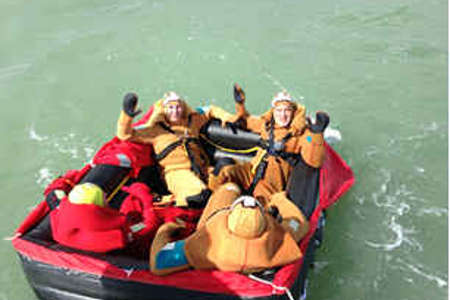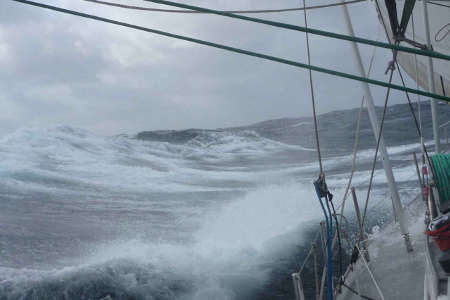At sea, a crisis can quickly escalate into unappealing scenarios. The first antidote to such dead ends remains anticipation. Made up of natural brainpower and elbow grease, it will allow you to master the elements and avoid the vast majority of problems at sea.
In navigation, anticipation must become second nature. More concretely, it covers everything that can be planned to avoid dangerous situations, categorized into the following areas:
-Human (physical fatigue, “silly” accidents, tensions between crew members)
-Environmental (dangerous weather, ensuring the boat stays on course)
-Material (keeping the boat in good working condition).
These three levels also relate to our second key principle: autonomy. For greater safety, you must train to handle as many situations as possible without external assistance. Of course, autonomy is built over time and experience. What’s in the mix? A cocktail of experience, skills, and determination that will help you face the unexpected. Naturally, this mix improves with age, up to a point...
As you can see, setting sail is not something to take lightly. The most effective solution is to train at a cruising school with skilled professionals. A friendly tip: diversify your experiences with different skippers to gain perspective on various techniques, extract the essence of them, and keep the ones you like best. If you work diligently, after at least two seasons, you should be ready to dive in (figuratively, of course) while remaining aware of your limits, so you can “rack up the miles” to gain experience. Once you’ve mastered the techniques, the best learning comes from being in a position of responsibility, where you must analyze everything yourself... Even if it means returning for more training to fill any remaining gaps. After two or three years of such an approach, beginner symptoms should have completely disappeared.


At sea, a crisis can quickly escalate into unappealing scenarios. The first antidote to such dead ends remains anticipation. Made up of natural brainpower and elbow grease, it will allow you to master the elements and avoid the vast majority of problems at sea.
In navigation, anticipation must become second nature. More concretely, it covers everything that can be planned to avoid dangerous situations, categorized into the following areas:
-Human (physical fatigue, “silly” accidents, tensions between crew members)
-Environmental (dangerous weather, ensuring the boat stays on course)
-Material (keeping the boat in good working condition).
These three levels also relate to our second key principle: autonomy. For greater safety, you must train to handle as many situations as possible without external assistance. Of course, autonomy is built over time and experience. What’s in the mix? A cocktail of experience, skills, and determination that will help you face the unexpected. Naturally, this mix improves with age, up to a point...
As you can see, setting sail is not something to take lightly. The most effective solution is to train at a cruising school with skilled professionals. A friendly tip: diversify your experiences with different skippers to gain perspective on various techniques, extract the essence of them, and keep the ones you like best. If you work diligently, after at least two seasons, you should be ready to dive in (figuratively, of course) while remaining aware of your limits, so you can “rack up the miles” to gain experience. Once you’ve mastered the techniques, the best learning comes from being in a position of responsibility, where you must analyze everything yourself... Even if it means returning for more training to fill any remaining gaps. After two or three years of such an approach, beginner symptoms should have completely disappeared.

